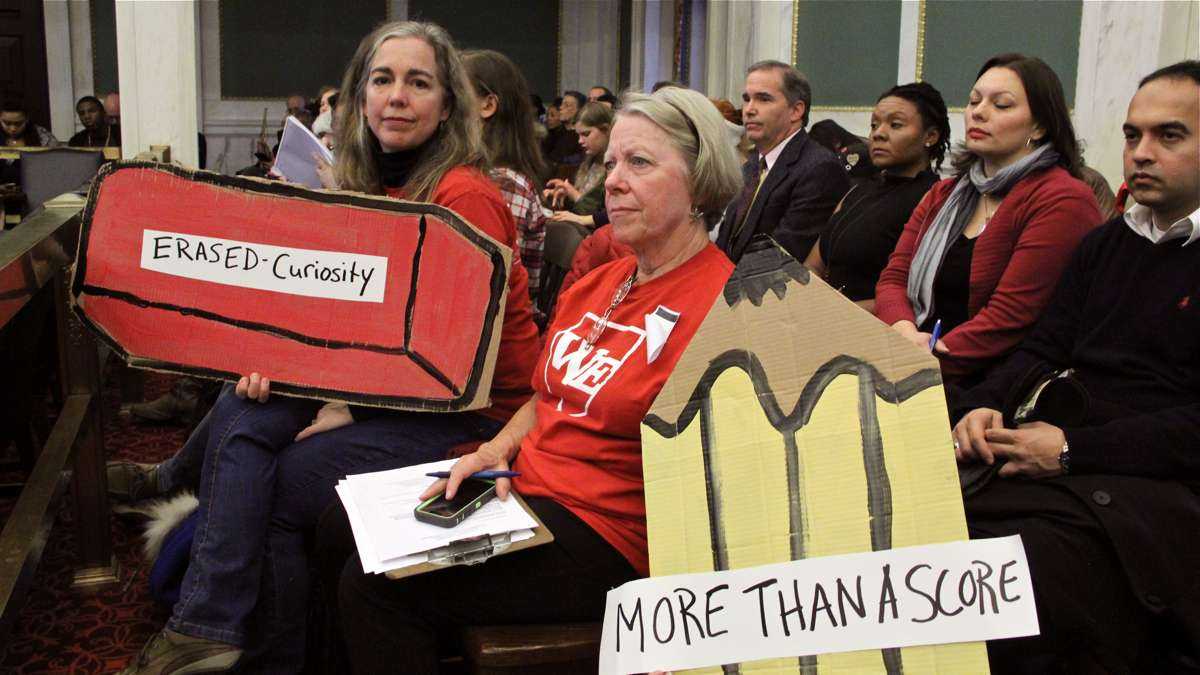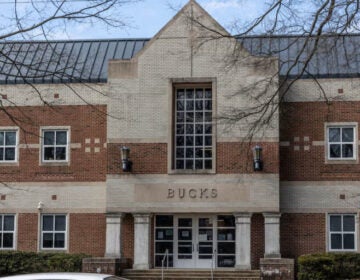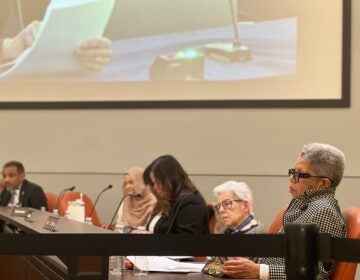Should Pa. require students to pass standardized tests to graduate high school?

Education activists Allison McDowell (left) and Diane Payne attend hearings at City Council to express their objections to standardized testing in November 2014. (Emma Lee/WHYY)
The clock is ticking. By 2017, in order to graduate high school in Pennsylvania, students must pass three state standardized tests.
The clock is ticking.
By 2017, in order to graduate high school in Pennsylvania, students must pass three state standardized tests: algebra, literature and biology.
Based on most recent student scores — especially in biology — if trends continue, Pennsylvania will soon see far fewer of its students walking down the aisle in cap and gown.
In order to preempt that reality, state Rep. Mike Tobash (R-Dauphin County) has introduced a bill that would repeal the state-mandated graduation requirement, leaving the decision to local school districts.
“The children of the Commonwealth of Pennsylvania, they need to learn, they need to be assessed, but when we’ve gone so far that we end up handcuffing our educational system with really an overwhelming amount of standardized assessment, we need to stop and put the brakes on here, take a look at it,” said Tobash.
The bill would also halt the creation and implementation of the seven other subject-specific Keystone exams called for by existing state law.
Tobash, who testified on the matter at a hearing at Philadelphia City Hall in November, is skeptical that the tests are actually judging students on material that’s applicable to modern workforce.
State Rep. Stan Saylor (R-York County), newly-minted as majority chair of the house education committee, has scheduled a hearing for the bill in Harrisburg on February 12.
“There definitely is support for it,” said Saylor. “Is there overwhelming support? I’m not sure.”
He said he will make his final decision after hearing testimony, but added that he’s “probably leaning in favor of the bill.”
All students — no matter language fluency or special-education disability — are given the same state assessments. In addition to high school Keystone exams, Pennsylvania students take PSSA exams every year in grades three through eight.
If students can’t pass the Keystone exam after two attempts, they can elect to complete a project assignment to be overseen by their teachers and then graded by educators from outside districts. Superintendents also have leeway to exempt the scores of 10 percent of their students.
‘A mandate that’s unfunded’
The backlash against the Keystone exam graduation requirement has created some common ground between conservatives weary of top-down edicts and liberals who feel that inadequate school funding has set children up for failure.
Public Citizens for Children and Youth executive director Donna Cooper advocated for the successful passage of the Keystone graduation requirement when she was policy director under former Gov. Ed Rendell. But she testified at November’s Council hearing that funding inequities make it unlikely that the poorest school districts have the wherewithal to adequately prepare their students.
State Rep. James Roebuck (D-Philadelphia), minority chair of the house education committee, agrees.
“The problem with Keystones, as structured, is that the state has not put sufficient resources into the education system to allow them to prepare students adequately to pass the exam,” he said.
Tobash concurred, calling the exams themselves “a mandate that’s unfunded” because of the lack of support given to schools to prepare and remediate students for the tests.
The state faces a projected $2 billion deficit for fiscal year 2015-16.
Roebuck leans towards voting for Tobash’s bill because, even if lawmakers manage to send additional funding to schools, “the ability to turn the system around quickly is limited.”
In the state senate, Andrew Dinniman (D-Chester County), has long advocated against testing, but his bills have failed to gain traction amongst the majority of the chamber. He introduced a similar bill last Spring that stalled in committee.
New Gov. Tom Wolf declined to comment specifically on the tenets of Tobash’s bill.
“Gov. Wolf knows we need tools to measure students’ progress and ensure they are equipped the skills needed to flourish in the 21st century, but testing should not be the only measurement,” wrote Wolf spokesman Jeffrey Sheridan in an email. “Gov. Wolf will work with acting Secretary Rivera to make sure we are teaching our children to think independently and look for creative and innovative solutions to problems.”
In addition to state exams, individual school districts also administer standardized benchmark assessments of their own. Students in the School District of Philadelphia take three added benchmark exams.
WHYY is your source for fact-based, in-depth journalism and information. As a nonprofit organization, we rely on financial support from readers like you. Please give today.





